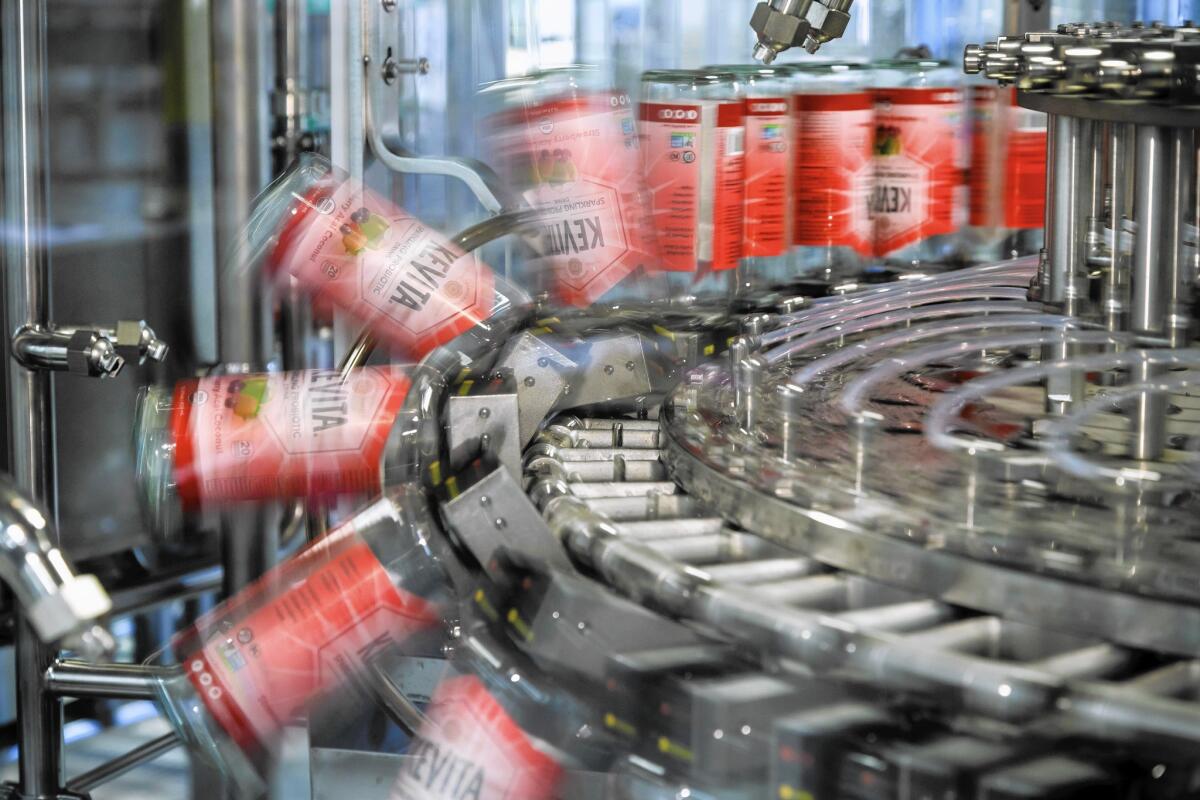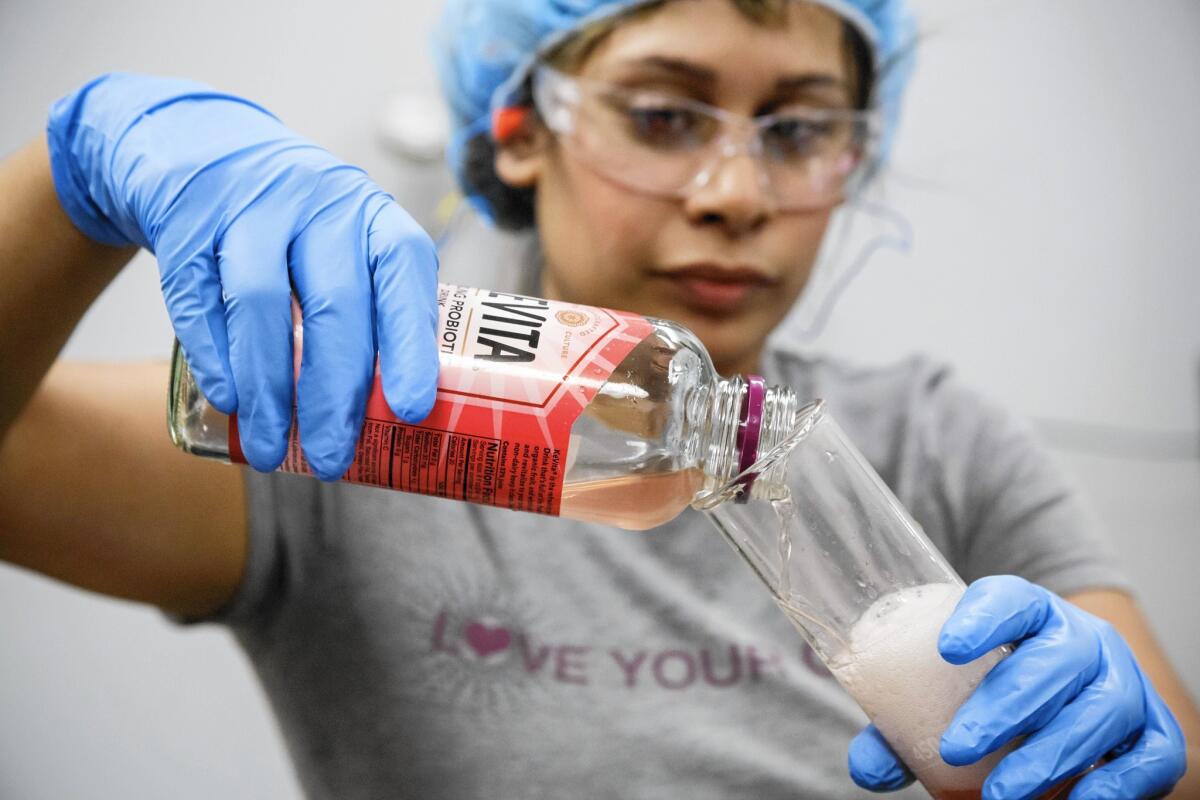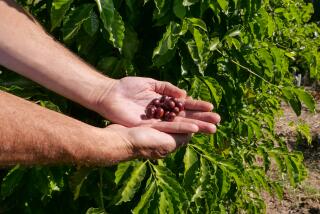Oxnard beverage maker cashes in on a resurgence in kombucha tea

Beverage company KeVita got its start in an Ojai kitchen.
But now, KeVita’s 57,000-square-foot facility in Oxnard can turn out 160,000 bottles of its popular fermented kombucha tea and other beverages in a day. Processes such as bottle cleaning are automated, and many systems can be operated from an iPad.
The kombucha business has grown up, turning into an industry that could reach $656.7 million in U.S. sales by 2019, according to research firm Euromonitor International.

Sharmistha Majundar, a quality assurance supervisor, checks content volume at the KeVita bottling facility in Oxnard.
“It fits right into that health and wellness trend,” said Duane Stanford, editor of Beverage Digest, a trade publication for the U.S. nonalcoholic beverage industry. “People are looking for healthier beverages, they’re looking at ingredients and because there’s a segment of consumers that are really interested in that, kombucha just kind of becomes one of those niche products that is able to get a following.”
But with that growth comes increased scrutiny by federal regulators to keep kombucha’s alcohol content under the limit acceptable for nonalcoholic beverages.
The tangy tea with a vinegar-like taste has been around for hundreds if not thousands of years. Advocates say the drink, made with tea, sugar and a culture of bacteria and yeast, has health benefits, such as improving digestion and liver function. (The Mayo Clinic has said that there’s no scientific evidence to back up these claims.)
“There’s an experience they have that’s difficult to quantify,” Hannah Crum, president and co-founder of trade group Kombucha Brewers International, said about customers. “Most of them say that it just makes them feel good and that’s what spurs them to buy it.”
The fermented probiotic beverage crept into the commercial beverage market in 1995 when G.T. Dave started to sell kombucha brewed in his parents’ kitchen. The then-17-year-old Beverly Hills High School dropout eventually turned his home-grown business, Millennium Products Inc., into the dominant force in the kombucha market.
Other producers started to jump in, but as the industry was poised to expand in 2010, kombucha bottles were pulled off shelves temporarily at Whole Foods Market Inc. stores.
The Austin, Texas-based grocery chain cited concerns with slightly elevated alcohol levels in some products that didn’t match their labels. After discussing the issue with suppliers, the company and producers decided on a voluntary withdrawal.
At the same time, federal regulators from the Alcohol and Tobacco Tax and Trade Bureau sent letters to some producers saying that their drinks contained 0.5% or more alcohol, higher than the limit to be considered a nonalcoholic beverage.
Some producers decided to obtain permits and release their kombucha as an alcoholic drink. Others reformulated to ensure that their kombucha could stay nonalcoholic, TTB spokesman Tom Hogue said.
The turmoil allowed KeVita to grab shelf space in grocery stores. The Oxnard-based company launched in 2010 with a sparkling probiotic drink that was seen as lighter but complementary to kombucha and signed a contract with Whole Foods.
About two years ago, the company ventured into kombucha and also added a line of sparkling probiotic tonics, making it the second-largest kombucha maker in the nation with about 15% of the market share, according to KeVita.
“All we wanted to do was execute, be in compliance and get our toehold in every Whole Foods in America,” KeVita Chief Executive Bill Moses said.
In the last few years, kombucha has seen a resurgence. Sales of ready-to-drink carbonated tea, which includes many kombucha brands, jumped from $127.8 million in 2009 to $529.1 million in 2014, according to Euromonitor.
For the non-carbonated bottled tea category, U.S. sales increased to $4.8 billion last year, up from $3.8 billion in 2009.
Stanford of Beverage Digest cautioned that it’s still too early to tell whether kombucha can reach the same level of mainstream success as smoothies, Naked Juice and similar healthy beverage counterparts.
“A lot of it just depends on how the American palate evolves when it comes to health and wellness drinks,” he said.
Other beverage makers are starting to snap up kombucha businesses to cash in on the industry’s potential.
In April, American Brewing Co. bought kombucha producer Bucha and sold its beer brewing operation six months later to focus on the fermented drink. The company is headquartered in Torrance and brews its kombucha in Montebello.
“We’re seeing huge growth at Kroger ... and this is Kroger in the Midwest,” said Chuck Santry, the company’s chief operating officer. “If the trend starts, it starts East and West and the Midwest is the last one to get it. But this is happening in the Midwest right now, and it’s growing really rapidly.”
Los Angeles-based Reeds Inc. also expanded beyond its traditional ginger drinks and natural sodas to start brewing kombucha in 2013. The company now controls about 5% of the market share, according to Chief Executive Chris Reed.
“It was pretty consistent with everything we were doing anyway,” he said. “There was always something appealing in kombucha. It has lower calories, but such a full, intense flavor.”
In the last few months, the industry seems to be in a similar situation as in 2010 after the TTB said it sent out warning letters to some kombucha producers about their alcohol levels.
“We have found product in the marketplace that exceeds the statutory limit after which something is considered an alcoholic beverage,” said Hogue of the TTB. “No one is saying you can’t make this. We’re just saying, ‘Do it legally.’”
KeVita, Reed’s and American Brewing Co. all said they did not receive letters and are in compliance with regulations.
Join the conversation on Facebook >>
Crum of Kombucha Brewers International said the trade group has been working with AOAC International, which develops public health and safety protocols, and government agencies including the TTB to create a new testing standard to measure the finer levels of ethanol in kombucha that is similar to forensic tests for blood alcohol concentration.
The trade group already has alcohol testing recommendations, as well as a verification program that provides a seal to products that are in compliance with all laws and best practices.
“There’s a lot of scrutiny on the kombucha category,” Moses of KeVita said. “What I hope we can do as an industry is find a way to alleviate regulators’ and consumers’ concerns about the category’s compliance and provide ongoing transparency.”
Twitter: @smasunaga
MORE BUSINESS COVERAGE
Sticker shock: Uber’s NYE surge pricing outrages some passengers
Bull market stalls; can it reignite in 2016?
Solar is in, biomass energy is out—and farmers are struggling to dispose of woody waste







